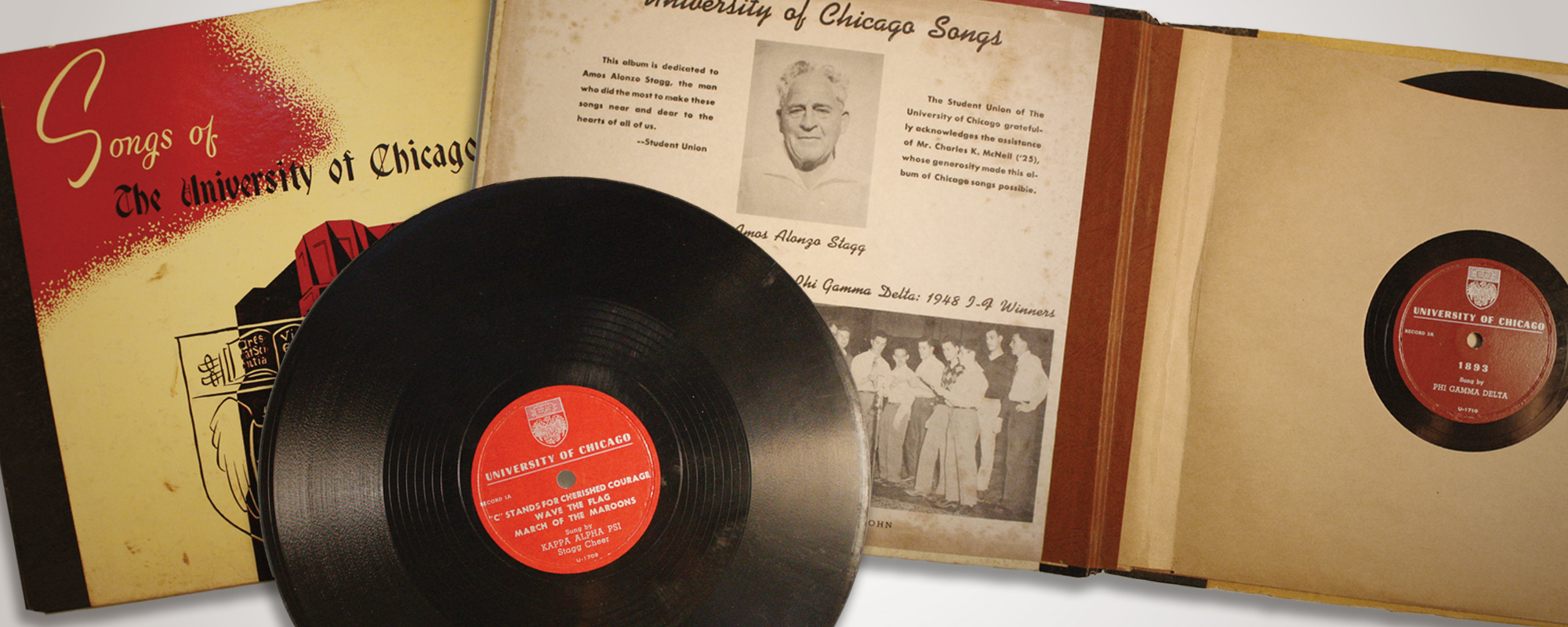
(Photography by Michael Vendiola)
Songs of the University of Chicago, an unexpected pleasure in a difficult year.
Last September, I returned to Harper Court, where the Core has its offices, for the first time since March. I had been granted special permission to retrieve files from my desk.
I almost forgot to check the mail room. There I discovered a package from Maurice S. Mandel of New York City, postmarked March 17—four days after our offices closed for the pandemic.
“Dear Ms. Golus,” read the handwritten letter inside, “A search of my archives resulted in this ‘find.’ … Please accept it as a token of appreciation for all you and your colleagues do to keep us old-timers in the loop.”
The “find” was Songs of the University of Chicago, a two-record 78 rpm set dedicated to Amos Alonzo Stagg, famed UChicago football coach of the Big Ten era. The gatefold album included photos of the two fraternities that recorded the songs: Kappa Alpha Psi, 1949 winner of the Interfraternity Sing, and Phi Gamma Delta, 1948 winner. The lyrics, including “Alma Mater,” “The Song of the ‘C,’” and “1893” were printed inside the back cover.
Mandel, AB’56, AB’57, came to UChicago at age 15 in 1951 (he told me later on the phone) on a half-tuition scholarship from the Ford Foundation. After he joined the yearbook staff, he won a journalism scholarship that covered the rest. He is no relation to the Mandels of Mandel Hall: “I can’t tell you how many times I was asked that question,” he says, “and wished I could have responded positively.”
A stack of the albums had been left behind in Ida Noyes, where the yearbook had its offices. The album, organized by the Student Union and funded by a donation from Charles K. McNeil, PhB 1925, seems to have been a one-off. According to an ad in the October 1950 University of Chicago Magazine, it cost $2.85 postpaid.
When Mandel pledged Delta Upsilon and moved into its house, he brought a few copies of the album with him. “We were very much into singing,” he says. “Fraternity songs, University of Chicago songs,” which they learned from the record. Mandel’s range is somewhere between tenor and baritone. “That’s a hard question to answer when you have a voice like mine,” he says. “I can carry a tune most of the time.”
When the album was made, the University had long since left Big Ten glory behind: Stagg retired in 1932, varsity football was dropped in 1939. But the old songs were preserved in the annual Interfraternity Sing. “Visions of a gay and colorful crowd overflowing Stagg Field on autumn Saturday afternoons comes [sic] to many moist eyes,” noted a Chicago Maroon article on the 1949 IF Sing, which Stagg himself attended. “The so-called collegiate spirit Chancellor [Robert M.] Hutchins booted off the quadrangles along with football was intercepted by the fraternities.”
As for athletic boosterism, Mandel says, “I recall very fondly an evening when our basketball team, which hadn’t won a game in years, was playing Navy Pier.” (The University of Illinois set up a temporary, two-year campus on Navy Pier after World War II, primarily for veterans on the GI Bill. This later became the University of Illinois at Chicago.) “Navy Pier had a rather weak team that year. Someone got the idea we ought to come out and cheer like we were a Big Ten team.
“That spirit spread like wildfire across the campus. There was a bonfire in the main quadrangle, a conga line, and lots of singing. Bartlett Gymnasium filled with fans. There were cheers going up: ‘Beat Navy Pier, beat Navy Pier.’ And the U of C won for the first time in years. That was a good fun time.”
